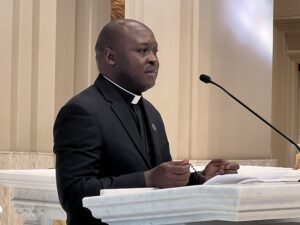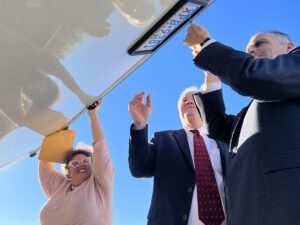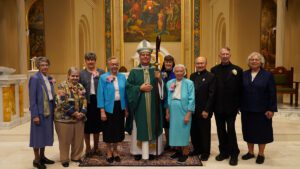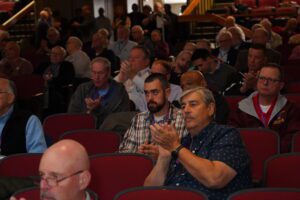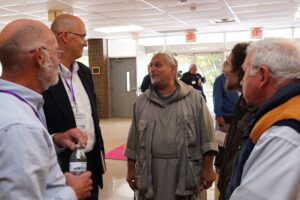A Priesthood Perspective by Fr. Gregory Reichlen

When I was 17 years old, an Adoration Chapel dedicated to Saint John Neumann was founded in my home parish, Saint Brigid in Friendsville, Susquehanna County (at the time Saint Joseph and St. Augustine).
I was a senior in high school and I don’t recall ever having experienced Adoration before this moment in my life or even knowing what it was! My parents had signed up for a weekly Holy Hour in the chapel. My memory is a bit fuzzy, but I believe that one day my parents asked if I could substitute for their weekly hour.
Suddenly, I was praying in silence, for an entire hour, in front of the Blessed Sacrament. I didn’t know at the time anything about prayer or how to pray, and this was my first time in front of a monstrance, just Jesus and me. This moment and a few subsequent Holy Hours were the seeds of my vocation, simply being in the Presence of Jesus and learning that prayer is a conversation with God, and not just saying prayers. I blame it on my parents!
As our Lord nourished my vocation through college and in the seminary, Jesus’ Real Presence in the Eucharist has always been at the center of my calling and formation.
Now having been ordained a priest for almost 15 years, I am just beginning to more fully grasp the gift of Christ who feeds us through this great mystery, and who speaks to us about His life and love.
In ministry, we priests are privileged to witness in people’s everyday lives the amazing connection between the celebration of the Sunday Mass, the preaching of God’s Word, the experience of an encounter with Christ, and the relationships that we nurture outside the walls of the church. We are the hands and feet of Christ!

All these things – Word, Real Presence, Encounter, and Relationship – are connected in the gift of the Eucharist, and Jesus’ great desire to revive and rebuild His Body, the Church, in this time and this generation.
Our generation is facing the greatest crisis that the Church has faced in hundreds of years. The sins and crimes of church leaders and shifting cultural winds have led us to a point where most people are not angry at the Church, but simply indifferent. Church doesn’t matter.
More than 90 percent of baptized Catholics under 50 years old do not participate whatsoever in the life of the Church. Ninety percent of congregations and other religious institutions, Catholic or otherwise, are dying a slow death.
It’s not just about lack of knowledge and belief in the Real Presence in the Eucharist and catechesis in general – it’s about reviving that connection for people between a welcoming experience, a moving encounter, and Christian relationships. It’s about forming disciples in this time and generation who are equipped and empowered to revive the Church. They give credible witness in their homes, schools, and the community that Christ is alive, forming relationships and inviting others!
At my current assignment, Saint John the Apostle Parish in East Stroudsburg, we are striving to do this. Our strategy of welcoming the unchurched and de-churched is focused on an irresistible experience of the weekend Mass for people of all ages.
Music inspires and uplifts people to come in the door and lift up their hearts in worship in the Sunday Mass. I work very hard to prepare my preaching series to nourish and challenge people to come back week to week.
Ministries, especially children’s ministries during Mass and hospitality ministers at the door, signal to people that they belong here! All along, we are striving to make a space for experience, relationship, and forming leaders.
Recently we held a Family Holy Hour after Mass where more than 200 people attended. Our adult Small Groups have brought over 135 people into deeper relationships in our parish, and it is inherently connected to the celebration of Sunday Mass because the same homily preached each week is the topic of the Small Groups.
Volunteers at our parish, nourished by the Eucharist, go out and serve the community in our Mission Partners program. An encounter with Christ is so fundamental to our faith that we founded an Adoration Chapel dedicated to Saint Joseph, to provide people the same opportunity that I had some 30 years ago to experience Christ’s calling in silent prayer.
In my home parish, Adoration has continued at Saint Brigid, a small country parish, to this very day! My parents still have their Holy Hour! Above all the Eucharist reminds me every day that Christ has not abandoned His Church. Wherever the Eucharist is celebrated and the Word of God is preached, Christ is Present and Alive!
Let us together lead a revival of our Church. May we have the courage to share in a hopeful and realistic vision for the future.
Father Reichlen was ordained to the Priesthood in June 2008. He has been Pastor of Saint John the Apostle Parish since 2015 and also currently serves as an Assistant Vocation Director

